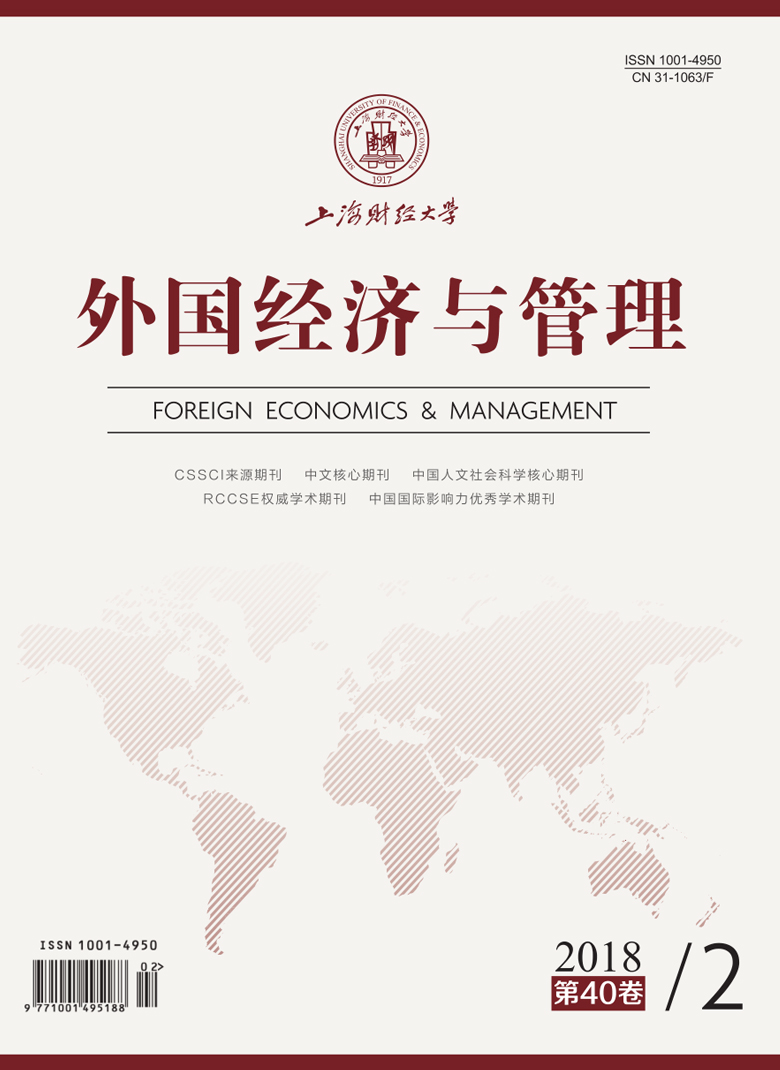本文基于BVD-Zephyr全球并购交易数据库,采用2001—2016年中国上市公司海外并购交易数据,从国际商务理论尤其是资源基础观角度重点剖析企业海外并购动因对股权选择的影响,并探讨了盈利能力对两者关系的调节作用。研究结果表明,企业海外并购动因对股权选择有显著影响,相对于战略资产寻求动因的企业,具有海外市场开拓动因的企业倾向于较高的股权并购比例;进而发现,在并购整合过程中,盈利能力显著地调节了企业海外并购动因与股权选择之间的关系,即与战略资产寻求动因的企业相比,具有海外市场开拓动因的企业随着企业盈利能力的不断提升,其股权并购比例较高的行为会被显著削弱;最后,本文还对企业性质、行业差异以及目标方区位等因素进行了分组检验,发现企业盈利能力对并购动因与股权选择之间关系的调节效应在不同情境下表现出一定程度的分化。本文的研究为中国企业做出科学、合理的海外并购的股权选择决策提供理论指导,并为国际学术界提供中国的经验证据。
企业海外收购动因会影响股权选择吗?——兼谈企业盈利能力的调节效应
摘要
参考文献
2 何任. 并购对收购公司长期股东价值影响的实证研究[D].哈尔滨: 哈尔滨工业大学, 2014.
5 梁中华, 余淼杰. 人民币升值与中国出口企业盈利能力——基于面板数据的实证分析[J]. 金融研究, 2014, (7): 1–15.
7 邵新建, 巫和懋, 肖立晟, 等. 中国企业跨国并购的战略目标与经营绩效: 基于A股市场的评价[J]. 世界经济, 2012, (5): 81–105.
9 王凤彬, 杨阳. 跨国企业对外直接投资行为的分化与整合——基于上市公司市场价值的实证研究[J]. 管理世界, 2013, (3): 148–171.
10 吴先明, 苏志文. 将跨国并购作为技术追赶的杠杆: 动态能力视角[J]. 管理世界, 2014, (4): 146–164.
12 张西征, 刘志远, 王静. 企业规模与R&D投入关系研究——基于企业盈利能力的分析[J]. 科学学研究, 2012, (2): 265–274.
13 周绍妮, 文海涛. 基于产业演进、并购动机的并购绩效评价体系研究[J]. 会计研究, 2013, (10): 75–82. DOI:10.3969/j.issn.1003-2886.2013.10.010
14 Anand J, Delios A. Absolute and relative resources as determinants of international acquisitions[J]. Strategic Management Journal, 2002, 23(2): 119–134. DOI:10.1002/(ISSN)1097-0266
15 Boateng A, Qian W, Tianle Y. Cross-border M&As by Chinese firms: An analysis of strategic motives and performance[J]. Thunderbird International Business Review, 2008, 50(4): 259–270. DOI:10.1002/(ISSN)1520-6874
16 Buckley P J, Clegg L J, Cross A R, et al. The determinants of Chinese outward foreign direct investment[J]. Journal of International Business Studies, 2007, 38(4): 499–518. DOI:10.1057/palgrave.jibs.8400277
17 Buckley P J, Munjal S, Enderwick P, et al. Cross-border acquisitions by Indian multinationals: Asset exploitation or asset augmentation?[J]. International Business Review, 2016, 25(4): 986–996. DOI:10.1016/j.ibusrev.2015.10.006
18 Chari M D R, Chang K. Determinants of the share of equity sought in cross-border acquisitions[J]. Journal of International Business Studies, 2009, 40(8): 1277–1297. DOI:10.1057/jibs.2008.103
19 Chen S S. The motives for international acquisitions: Capability procurements, strategic considerations, and the role of ownership structures[J]. Journal of International Business Studies, 2008, 39(3): 454–471. DOI:10.1057/palgrave.jibs.8400357
20 Contractor F J, Lahiri S, Elango B, et al. Institutional, cultural and industry related determinants of ownership choices in emerging market FDI acquisitions[J]. International Business Review, 2014, 23(5): 931–941. DOI:10.1016/j.ibusrev.2014.02.005
21 Cuervo-Cazurra A, Genc M. Transforming Disadvantages into advantages: Developing-country MNEs in the least developed countries[J]. Journal of International Business Studies, 2008, 39(6): 957–979. DOI:10.1057/palgrave.jibs.8400390
22 Cui L, Jiang F M. State ownership effect on firms’ FDI ownership decisions under institutional pressure: a study of Chinese outward-investing firms[J]. Journal of International Business Studies, 2012, 43(3): 264–284. DOI:10.1057/jibs.2012.1
23 Dunning J H. Location and the multinational enterprise: A neglected factor[J]. Journal of International Business Studies, 1998, 29(1): 45–66. DOI:10.1057/palgrave.jibs.8490024
24 Gaffney N, Karst R, Clampit J. Emerging market MNE cross-border acquisition equity participation: The role of economic and knowledge distance[J]. International Business Review, 2016, 25(1): 267–275. DOI:10.1016/j.ibusrev.2015.05.005
25 Guadalupe M, Kuzmina O, Thomas C. Innovation and foreign ownership[J]. American Economic Review, 2012, 102(7): 3594–3627. DOI:10.1257/aer.102.7.3594
26 Gubbi S R. Dominate or ally? Bargaining power and control in cross-border acquisitions by Indian firms[J]. Long Range Planning, 2015, 48(5): 301–316. DOI:10.1016/j.lrp.2015.07.004
28 Li J T, Li P X, Wang B. Do cross-border acquisitions create value? Evidence from overseas acquisitions by Chinese firms[J]. International Business Review, 2016, 25(2): 471–483. DOI:10.1016/j.ibusrev.2015.08.003
29 Meyer K E, Wright M, Pruthi S. Managing knowledge in foreign entry strategies: A resource-based analysis[J]. Strategic Management Journal, 2009, 30(5): 557–574. DOI:10.1002/smj.v30:5
30 Moatti V, Ren C R, Anand J, et al. Disentangling the performance effects of efficiency and bargaining power in horizontal growth strategies: An empirical investigation in the global retail industry[J]. Strategic Management Journal, 2015, 36(5): 745–757. DOI:10.1002/smj.2015.36.issue-5
31 Nicholson R R, Salaber J. The motives and performance of cross-border acquirers from emerging economies: Comparison between Chinese and Indian firms[J]. International Business Review, 2013, 22(6): 963–980. DOI:10.1016/j.ibusrev.2013.02.003
32 Ouimet P P. What motivates minority acquisitions? The trade-offs between a partial equity stake and complete integration[J]. Review of Financial Studies, 2013, 26(4): 1021–1047. DOI:10.1093/rfs/hhs125
33 Stiebale J. Cross-border M&As and innovative activity of acquiring and target firms[J]. Journal of International Economics, 2016, 99: 1–15. DOI:10.1016/j.jinteco.2015.12.005
34 Yu J, Lee S Y, Han K. FDI motives, market governance, and ownership choice of MNEs: A study of Malaysia and Thailand from an incomplete contracting perspective[J]. Asia Pacific Journal of Management, 2015, 32(2): 335–362. DOI:10.1007/s10490-015-9412-5
35 Zheng N, Wei Y Q, Zhang Y B, et al. In search of strategic assets through cross-border merger and acquisitions: Evidence from Chinese multinational enterprises in developed economies[J]. International Business Review, 2016, 25(1): 177–186. DOI:10.1016/j.ibusrev.2014.11.009
引用本文
赵毅, 乔朋华. 企业海外收购动因会影响股权选择吗?——兼谈企业盈利能力的调节效应[J]. 外国经济与管理, 2018, 40(2): 51-67.
导出参考文献,格式为:
上一篇:创业机会共创研究探析





 , 1
, 1 11629
11629  10657
10657

